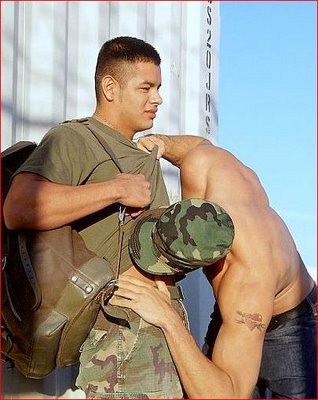Military Monday Part 1
A Gay Soldier’s Story
Ronald Chapman thought the Army would provide him with a career. What he found instead was antigay harassment and physical abuse
Ronald Chapman had a rough life growing up. His parents divorced when he was 3. He was put into foster care at 4, and his foster mother booted him out at 19 for being gay. But Chapman had a plan to seek deliverance from life’s cruel disappointments. He would join the Army, serve his country, and see the world.
What he never imagined, though, was that his enlistment would give way to the emotional—and in his case, physical—torture that awaits some gay and lesbian recruits. From the outset of his arrival at boot camp last August, Chapman received daily doses of name-calling and gay baiting. The harassment culminated one night in a sinister bashing that left zero physical evidence but raised one excruciating dilemma: Chapman knew that if he reported the attack and its homophobic motives, he risked discharge for violating the Pentagon’s “don’t ask, don’t tell, don’t harass, don’t pursue” policy.
“The Army was a dream my entire life,” says Chapman, now 20, speaking from his Brockton, Mass., home. “I liked the idea of being in charge, of fighting for my country. And I liked the uniform.”
Chapman’s story was outlined in a report on “don’t ask, don’t tell” issued in March by the Servicemembers Legal Defense Network, an advocacy organization for lesbian and gay military personnel. While the report, the seventh annual from SLDN, chronicled an overall decline in harassment in the military and particularly in the Army, abuse of the policy remains rampant, according to SLDN officials.
“What happened to Ron, who only wanted to serve his country, is a source of great concern to us,” says Jeff Cleghorn, an SLDN staff attorney. “There is a disconnect between policy and practice in many instances. Though the Army has made some solid attempts to train soldiers on the policy, there is still a clear failure of leadership among the ranks.”
Chapman’s case illustrates that point. He realized he was gay in high school, where he joined ROTC. At first he had no trepidation about being gay in today’s Army. But as his enlistment date neared, doubts piled up.
“Right before I left, I had second, third, and even fourth thoughts,” he says. “I knew that if someone found out, there would be a lot of problems.” Chapman stretches 5 feet 9 inches tall but weighs a wispy 110 pounds. “I admit, I’m very feminine in nature,” he says.
Still, Chapman was convinced nobody would find out. After all, during his nine-month recruitment, officers of every rank told him repeatedly and in no uncertain terms that the Army fully backs “don’t ask, don’t tell.” “They make you sign a notice,” he recalls. “It says you’ve been briefed about the policy, that you won’t ask, tell, harass, or pursue. And if you do, you’ll lose your rank, your paycheck, your career.” Army recruiters pounded home the point until “there’s no doubt in your mind,” Chapman continues. “You feel like there’s a brick wall being built up around the part of you that’s gay. Nobody will ever know.” But, he cautions, “when you get there, it’s a whole different story.”
The first morning of Chapman’s basic training, at Fort Jackson, S.C., the drill sergeant selected him for a cruel dressing-down. “He said because I had earring holes, I must be a faggot,” Chapman recalls. Other recruits, following the officer’s lead, joined in a chorus of derisive snickering.
“And right there, those lines I’d been assured of were literally erased,” Chapman says. “Right in front of the entire company of 700 prospective soldiers. And now they’ve got this idea that, ‘Well, if the drill sergeant can do it, why can’t we?’”
The incident led to nonstop harassment by other soldiers. “At first they made remarks like ‘You’re too feminine’ or ‘Aren’t you afraid to get dirty?’” he says. “It was meant to ridicule me, without saying ‘you’re gay’ in those exact words, because they knew—they had been told— about the policy.” As time passed, the harassers grew bolder, muttering “faggot” at Chapman and warning him to stay out of the latrine. His handful of Army buddies dwindled to two “because everyone thought I was gay.”
But Chapman proved himself a fine soldier. He ranked among his platoon’s best in physical and academic scoring. He was made squad leader over 10 men and chosen as acting platoon sergeant, drilling some 30 to 40 soldiers when the regular sergeants were called away. “But people wouldn’t listen,” Chapman says. “I’d yell out a command and they would snicker in the background.”
Chapman grew disheartened. He wrote a friend at home, telling her of the endless problems. “I didn’t want to be there anymore,” he says. That’s when one soldier Chapman considered friendly told him, “People want to beat your face in. If I were you, I’d find a way to get out of here soon.”
“I was scared shitless,” he says. “How do I perceive this? Is this a threat, or does he not want me to get hurt?”
Chapman complained to his superiors about the disrespect and threats, without mentioning why he was targeted. They swore the matter would be investigated. “They certainly put up a very good front,” Chapman says. “They sounded genuinely concerned, and they guaranteed nothing would happen to me because I came out with this story.” But when no action was taken, Chapman decided to let the matter ride. “What could I do?” he says now.
Chapman’s silence cost him. A few days later, at 2 a.m., he was rousted from sleep by four or five soldiers armed with blankets stuffed with economy-size bars of soap. They whaled on Chapman before he could rise from his top bunk, shared with some 60 others in close barracks. “It’s called a ‘blanket party.’ It’s legendary in the military,” he says. “You wrap soap in a blanket so it won’t leave marks, but it hurts like it did.”
A few days later he went back to his officers and reported the incident. He gave the names of his attackers, whom he recognized by their voices. In his report he mentioned the drill sergeant who called him “faggot.”
Again, Chapman says, he was assured that the matter would be investigated. But, he adds, there were no offers of medical attention and certainly no apologies. He didn’t disclose his homosexuality, “but everyone knew what everyone was talking about. There was a tacit acknowledgment of ‘We know why this happened.’”
That’s when Chapman’s friends at home contacted SLDN’s Cleghorn. The attorney encouraged Chapman to complain again about the investigation’s slow pace. Chapman went to the commander, whose response was to offer Chapman a transfer to another company, meaning he would have to start boot camp over from scratch.
With just three weeks left of his stay in boot camp, Chapman could have chosen to ride the harassment out. He decided not to. In October he wrote to his commander, recounting everything. He added, “As a homosexual in the U.S. Army, it’s wrong that anyone should be treated this way, regardless of who they want to sleep with, because that is behind closed doors and doesn’t affect who I am.”
The discharge was started immediately. Chapman had requested one, knowing it would come anyway, for violating the military’s policy. He was handed an uncharacterized discharge, one step below general. The reason listed was “homosexual conduct.”
Awaiting discharge, Chapman was ordered to sleep in the orderly’s office to avoid more attacks. Then it was over. He was on the 26-hour bus ride home. “I felt like my childhood dreams had been ripped from my own hands,” he says. “It’s like seeing someone you love die. I think I cried my eyes out for 24 of those 26 hours.” Once he was home, it took months to get the investigation report. In it, every soldier in the company had been interviewed—except for Chapman’s alleged attackers. No explanation was given for the omission.
Army prosecutors contacted Chapman, who wanted to build a case against his attackers. Chapman had just started a new job and told the brass he’d cooperate “at my convenience.” The Army, he says, took that as a “no” and promptly closed the case.
Meanwhile, Chapman found his future in disarray. He had planned to learn to cook in the Army and one day open a restaurant. Instead, he is now getting an English degree so he can teach and write his life story. “I want to write and really do some damage for the service, because I’ve lost all respect for them,” he says.
Looking back on his experience, Chapman says he sees how unrealistic his military dreams were. “I almost feel bad for saying this, but I want to dissuade gay people from going into the military,” he says. “It’s not a place that accepts us.”









No comments:
Post a Comment